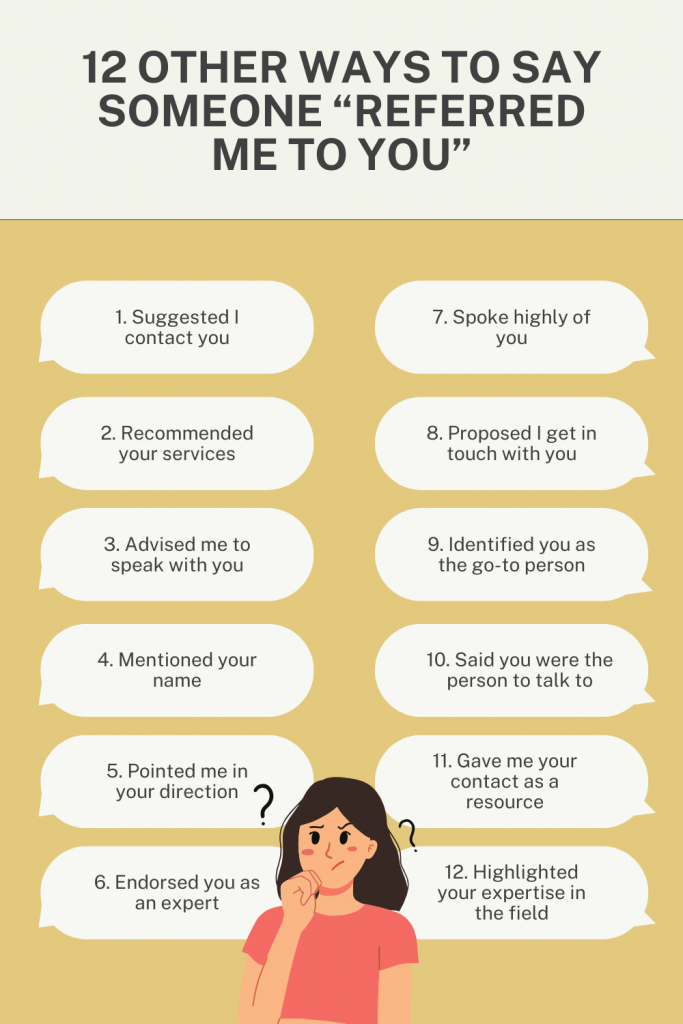The phrase someone “referred me to you” means that the person speaking was recommended or directed to contact you by another person. For example, when a recruiter contacts a potential employer, they might use this phrase if they were recommended by a mutual contact or a current employee of the company:
“I am reaching out to express my interest in the marketing manager position at your company. Alex Brown, your lead graphic designer, referred me to you, mentioning that my skills in strategic marketing and team leadership might be a great fit for your team.”
Can I Say Someone “Referred Me to You” in Email?
Yes, you can definitely say someone “referred me to you” in an email. People use that kind of thing all the time when networking or reaching out professionally. It’s a nice clear way to break the ice and explain why you’re emailing this person out of the blue. Telling them someone referred you also gives them some context about who you are, which makes them more likely to get back to you.
That way it clicks for them right away and they have an idea of what you need. For instance, you could say something like “After discussing my need for expert legal advice, my colleague, Susan Patel, referred me to you, praising your extensive experience in corporate law.”
Someone “referred me to you” or “I was referred to you by” is correct?
Both “Someone referred me to you” and “I was referred to you by” are correct and can be used in different contexts.
Someone “referred me to you” is a bit more general and doesn’t specify who made the referral. It’s useful when you want to mention that a referral occurred but either can’t disclose or don’t need to specify who referred you.
“I was referred to you by [person’s name]” is more specific and directly names the person who made the referral. This is useful for providing clarity and context, especially if the person you’re speaking to knows the referrer.
Other Ways to Say Someone Referred Me to You
1. Suggested I contact you
Examples: “My colleague, Sam, suggested I contact you regarding your expertise in market analysis.”
Usage: When someone says” Suggested I contact you”, it usually means they personally vouch for your skills or knowledge about something specific. Like if you need advice on remodeling my kitchen, your neighbor might say, “You should talk to Luis. He just redid his kitchen and it looks awesome. I told him to expect your call.”
2. Recommended your services
Examples: “A former client of yours highly recommended your services for our web development needs.”
Usage: This phrase is more when referring to a professional or business service. Like if you ask around about a good plumber my friend says “Oh, Definitely call John’s Plumbing, and several people have recommended them before for quality work.”
3. Advised me to speak with you
Examples: “My mentor advised me to speak with you about career opportunities in the tech industry.”
Usage: Use “Advised me to speak with you” when you’re asking around about something more serious and want to get the right information from an expert.
4. Mentioned your name
Examples: “In our meeting yesterday, our manager mentioned your name as a key contact for this project.”
Usage: “Mentioned your name” is more casual, just saying you came up in conversation related to something we were talking about. It’s not as much of a recommendation more just acknowledging they know you have something to do with the topic.
5. Pointed me in your direction
Examples: “My coworker pointed me in your direction for advice on digital marketing strategies.”
Usage: If someone says “Pointed me in your direction,” it means they basically guided me to you, based on a casual chat or general suggestion about something you can help with.
6. Endorsed you as an expert
Examples: “Dr. Brown endorsed you as an expert in renewable energy technologies.”
Usage: When someone has specifically praised the person’s skills or knowledge in a field.
7. Spoke highly of you
Examples: “Several of your former students spoke highly of you, which led me to seek your guidance.”
Usage: People say that when recommending someone based on their solid reputation or past projects – you can see it a lot with professional stuff where character’s important.
8. Proposed I get in touch with you
Examples: “My business advisor proposed I get in touch with you regarding investment opportunities.”
Usage: This expression is more formal. You can say it when asking for professional advice, collaborate with, or include in a business plan.
9. Identified you as the go-to person
Examples: “In our industry forum, they identified you as the go-to person for regulatory compliance matters.”
Usage: When someone’s labeled you as the go-to person for something means they’ve singled you out as the best person for a specific need or issue. That’s common at jobs where you really need an expert in one particular area.
10. Said you were the person to talk to
Examples: “Everyone in the office said you were the person to talk to about organizing the company retreat.”
Usage: It’s kind of informal though, so you see it more in office chatter than formal writing.
11. Gave me your contact as a resource
Examples: “The seminar leader gave me your contact as a resource for learning more about mindfulness in the workplace.”
Usage: When someone provides the person’s contact information as a helpful resource.
12. Highlighted your expertise in the field
Examples: “At the conference, several speakers highlighted your expertise in sustainable urban planning.”
Usage: That’s good for introductions at conferences or something formal.

Conclusion
It’s totally fine to say in an email that someone referred you to the person you’re emailing. It creates a link between you two if you know the same person. Plus it makes you seem less random. It gives some background to why you’re reaching out, which can help convince them to give you a hand or at least write back. Use that referral line to make that first connection.
FAQs
1. Is it appropriate to mention a referral in a professional email?
Yes, it is appropriate to mention a referral in a professional email. It helps to establish a connection and often makes the recipient more receptive to your message.
2. How should I phrase a referral in an email?
You can phrase it as “I was referred to you by Jessica,” or “Someone referred me to you for [specific reason or topic].”
3. Should I always name the person who referred me?
Ideally, yes. Naming the referrer helps to establish credibility and context. However, ensure you have their permission before doing so.
4. Can using a referral increase my chances of getting a response?
Yes, referrals can often increase the likelihood of a response as they add a level of trust and familiarity to your outreach.









